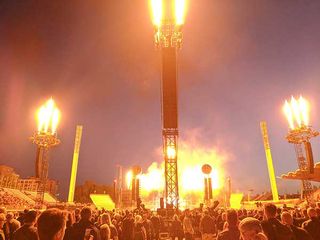The irresistible rise of Rammstein over the past 25 years has been one of heavy metal’s most unlikely, hilarious and misunderstood success stories. These enigmatic East Berliners rarely give interviews, steadfastly sing in their native German, and often face condemnation for their purposely provocative use of transgressive taboo imagery.
Even so, with more than 10 million album sales, Rammstein have slowly blossomed into the most successful German-language band ever, with a reputation for explosively exciting live shows which fall somewhere between Wagnerian operas and cyberpunk torture-porn carnivals. Their current international stadium tour is their biggest yet, pushing their orgiastic sadomaximalist spectacle to new heights of excess-allareas showmanship.
Rammstein’s ascent to stadium-rocking notoriety has been eased along the way by celebrity champions including Trent Reznor and David Lynch. But it has not always been a smooth ride. Their fondness for ambiguous totalitarian imagery, hard-core sex and violent subject matter has seen the band censored, banned and attacked in the media.
A casual observer might dismiss them as professional edgelords who are, quite literally, playing with fire to generate cheap clickbait controversy. But there is logic and poetry behind the band’s avant-punk anarchy, backed up by a deep cultural hinterland and a heavy dose of black humour. When Rammstein make political statements, they mostly take aim at worthy enemies, not easy targets. With great power comes great responsibility, ideally with the added bonus of weapons-grade pyrotechnics.

Like Angela Merkel, the Trabant car and pickled gherkins, Rammstein are one of pre-unification Communist East Germany’s most enduring cultural gifts to the world. All six members – singer Till Lindemann, lead guitarist Richard Z Kruspe, rhythm guitarist Paul Landers, keyboard player Christian ‘Flake’ Lorenz, bassist Oliver Riedel and drummer Christoph Schneider – grew up behind the Iron Curtain in the workers’ paradise of the DDR, Soviet Russia’s most ruthlessly efficient satellite state.
In their teens and twenties, they risked regular harassment and arrest by playing in dissident art-punk bands with names like Feeling B, Elegante Chaos, First Arsch and Orgasm Death Gimmick. They came together as Rammstein only after the fall of the Berlin Wall, in 1994, but their attitude to censorship and authority was shaped back in the Eastern Bloc. Their use of ironic humour, taboo themes and totalitarian imagery makes much more sense in this political context.
Being from the Communist East was also a key factor in Rammstein’s bold but commercially risky decision to sing in their native German language, unlike most of their West German rock peers. Having been taught Russian rather than English at school, like all East German children, former drummer and teenage swimming champion Lindemann felt more comfortable sticking with his mother tongue.
“The German lyrics were simpler and sounded harder,” Lindemann explained to Rolling Stone magazine in 2014. “The German illustrated the music better than the English did, with its soft vowels. Besides, this was in the time of crossover-grunge. Only long-haired blondes, dreadlocks and second-rate Rage Against The Machine and Nirvana copycats were in every club. We sure didn’t want that.”
Full of brutal poetry, double meanings, deadpan humour and sly literary allusions, Rammstein anthems such as Du Hast, Ich Will and Mein Herz Brennt only really make sense in German.
“I saw a lot of East German bands that sung in very bad English, to people who didn’t understand English,” Lorenz recalled in Metal Hammer earlier this year. “It was really stupid. But if you reallyr earlier this year. “It was really stupid. But if you really want to tell your emotions, you have to speak in your mother tongue.”

Emerging as part of mid90s Neue Deutsche Härte (New German Hardness) movement, Rammstein’s thunderous, electronically charged, groove-driven alt.metal sound initially marked them out as Teutonic cousins of Nine Inch Nails or Marilyn Manson.
Signed by the German indie label Motor Records, they scored only modest success with their 1995 debut album Herzeleid. Their profile enjoyed a bigger boost two years later when Trent Reznor showcased them on the soundtrack to David Lynch’s surreal turbo-noir thriller Lost Highway, which helped propel their second album, 1997’s Sehnsucht, to international cult hit status. But it was their increasingly ambitious, cinematic live shows that really cemented Rammstein’s burgeoning reputation as a must-see band, with flamethrowers, wild costumes and high-voltage theatricality part of their overall package right from the early days.
Lindemann even underwent training as a qualified pyrotechnician, and began incorporating flamethrowers and fire stunts into his performance. Ironically, the singer first embraced his twisted firestarter side as a way of coping with his essential shyness.
“I wasn’t really happy on stage,” he explained to Rolling Stone. “I wore sunglasses, as I couldn’t stand the stares. I had stage fright and thought: ‘What am I doing here at all?’ I used to be a drummer, and then I always had something to do. Now, I was standing there, up front, and everyone was staring at me. It was uncomfortable for me, so I wanted to compensate for that somehow. That’s where the fire came into play."
If you really want to tell your emotions, you have to speak in your mother tongue.
Christian ‘Flake’ Lorenz
At the end of the 90s, Rammstein signed a major record deal with Universal Music and began scoring high-charting hits in Germany. They also enlisted Berlin-based Nicolai Sabottka as their production manager and special-effects expert. Tasked with supplying the band with cutting-edge visual stunts, Sabottka now has a team of engineers and an entire pyrotechnics factory in Montana at his disposal.
In 2001 the band hired lighting and production designer LeRoy Bennett, whose prestige clients already included Nine Inch Nails and Marilyn Manson. Bennet designed outlandish stage sets like the giant uterus that opened the tour for the Mutter album, the band’s 2001 major-label debut.
Bennet’s stage designs for Rammstein have since grown in scale and ambition, with split-level science-fiction megastructrures that recall Metropolis, Blade Runner and HR Giger’s bio-mechanical designs for Alien. The band have also ventured far beyond their original none-more-black hard-rock warrior clobber, with heroically high-camp stage outfits ranging from glittering angel’s wings, to fluffy pink fleeces, to matching lederhosen which look both mockingly Germanic and gloriously homoerotic.
All this overblown pageantry can be both a strength and weakness for Rammstein, who often face criticism that razzle-dazzle spectacle takes precedence over musical prowess.
“I don’t want to be another Kiss, where people talk about make-up and stuff like that and no one talks about the music” guitarist Richard Z Kruspe told Metal Hammer in 2018. “We do have a sense of humour, we do laugh about it, we have fun… but we’re not Spinal Tap. We take the music and the lyrics seriously.”
Speaking to Rolling Stone in 2014, Lindemann admitted: “The band is divided on this issue. It’s too much like a circus act for some, they would rather have the music be more of the focus. Then there are people like me, who have great aspirations in these elements of the show, in the tinsel and the glitz, in the action and the fire.”
In the same interview, he argues that Rammstein’s weapons of mass distraction have been crucial to their enduring success: “When it comes to other bands, you really have to be a hard-core fan to be content with looking at a couple of guys in jeans and T-shirts playing through their set list for two hours.”
Speaking to the Independent in 2017, guitarist Paul Landers admitted: “Sometimes the show overshadows the music, and we try to not let that happen. But the music is very good in my eyes, and we try to have a balance between both. If you meet a nice woman with blonde hair and big boobs, you might start talking to her because of her appearance, but then you find out that she is clever and funny and kind-hearted. We are trying in Rammstein to be the blonde with a brain.”
Growing up in a repressive police state like East Germany left a lasting impression on Rammstein. Questioning authority, defying official media and pushing against the norms of good taste are the classic traits of dissident artists in totalitarian regimes. Even the band’s name, which alludes to the Ramstein air-show disaster of 1988 that left 70 people dead, is a deliberately punky affront against tasteful propriety.
“Part of the reason Rammstein were so progressive is that we felt so much censorship back in the day,” Krespe said earlier this year. “In Rammstein, we were trying to get rid of all kind of censorship – from other people and from ourselves too. I think that’s why we all went: ‘What the fuck, we don’t care.’”
According to Landers, Rammstein “like being on the fringes of bad taste”. Lorenz has also claimed that “the controversy is fun, like stealing forbidden fruit. But it serves a purpose.”
This take-no-prisoners attitude to free speech is admirable in many ways, but it has landed the band in hot water many times. After the 1999 Columbine High School massacre in Colorado, it emerged that one of the killers, Eric Harris, was a Rammstein fan.
When the band were lambasted in the German media, they responded with an official statement of condolence to the victims, but added that they “wish to make it clear that they have no lyrical content or political beliefs that could have possibly influenced such behaviour. Additionally, members of Rammstein have children of their own, in whom they continually strive to instil healthy and non-violent values.”
Rammstein’s music has also been linked to the 2004 Beslan hostage siege in Russia, the 2007 Jokela school shooting in Finland, and more. Lindemann concedes that damaged people with warped views are often drawn to extreme music, but he has little sympathy with any ‘blame the artist’ arguments for real-world violence.
“If there are radical feelings in people, anything can wake them,” Lindemann told Rolling Stone. “A painting, a picture, whatever. It’s just a coincidence that it happened to be our music. It’s important to think about what caused them to make their decisions, how they became animals, not their taste in music."
More controversially, Rammstein have long been dogged by accusations of neo-Nazi sympathies, largely because of the quasi-fascistic and militaristic imagery in their visuals and lyrics.
These suspicions came to a head in 1998 when the band released a video for their cover version of Depeche Mode’s Stripped, which featured footage from Nazi film director Leni Riefenstahl’s 1938 documentary Olympia, about the 1936 Berlin Olympics.
After playing on MTV for a week, the video was pulled following a storm of protest. A little disingenuously, Rammstein professed shock at the angry reaction to Stripped, which betrays a certain naivety at least. Ironically, they had originally planned to use vintage Soviet propaganda footage for the video, which looked strikingly similar to Riefenstahl’s Nazi-era material.
“Everyone went crazy,” Lindemann recalled to Rolling Stone. “There were commentaries and articles. Then foreign musicians came along; I won’t mention names, but they felt aggravated by it and wanted to have us shot, including Tim Renner, our label boss. That was a bad situation. It was on MTV for a whole week until the trouble began… But I think it’s a great video. Whether we would do it again is another thing.”
Naive mistake or deliberate provocation, Rammstein reacted to the Stripped scandal by embracing less ambivalent visual and lyrical imagery. In 2001 they released Links 2-3-4, which borrows from a famous East German propaganda song written by Communist playwright Bertholt Brecht.
“If you want to put us in a political category, we’re on the left side,” Kruspe told Grand Rapids Press in 2006. “That’s the reason we made the song”. Their later videos have featured a more racially mixed cast, while their recent anti-anthem Deutschland cast a critical eye on flagwaving patriotism.
Far from flirting with Nazi chic, several Rammstein members retain a strong attachment to the communal left-wing ethos of East Germany, where fascism was the darkest taboo. “We have grown up as socialists,” Lindemann told Rolling Stone. “We used to be either punks or goths; we hate Nazis! We are coming from an entirely different culture. We used to beat up those rightwing morons, and we still would today.”

Rammstein may have become more cautious with political symbolism in recent years, but the group remain reliably filthy with their graphic sexual images on stage and screen.
In 1999, Lindemann and Lorenz spent a night in jail after being arrested on obscenity grounds for deploying a liquid-spurting dildo on stage in Worcester, Massachusetts. In 2009, the band’s sixth studio album, Liebe ist für Alle Da, was effectively banned after it was temporarily placed on a special Index by the German government department in charge of protecting minors from harmful media content.
The lyrics and imagery around two songs, Ich Tu Dir Weh and Pussy, were singled out for allegedly promoting BDSM and unprotected sex. The latter even came with a NSFW video directed by frequent collaborator Jonas Akerlund, which featured body doubles for Rammstein engaging in hard-core sex with porn stars.
Tellingly, it gave the band their first German Number One. The ban on Liebe ist für Alle Da was soon overturned, but not until after 85,000 copies had been destroyed or re-pressed. In 2016, Rammstein launched a belated lawsuit against the German government seeking €66,000 in compensation.
“We deemed the reason as absurd, but it wasn’t a laughing matter to us,” Lorenz said. “It only means annoyance when an album is put on the Index. The albums have to be re-pressed. We were approached about it all the time, when really all we wanted was to keep touring in peace. Pussy was supposed to be a funny party song, not a provocation.”

If anything, Rammstein’s sexually provocative antics have only become bolder in recent years. Their live show has featured a giant penis-shaped foam cannon and scenes of simulated buggery between Lindemann and Lorenz.
These hilarious acts of absurdist theatre earned the band threats of arrest in Russia, where LGBT rights have suffered under Putin’s authoritarian regime. In a daring act of defiance, two members of Rammstein shared a same-sex kiss on stage at their most recent Moscow show in July, sticking two fingers up to anti-gay oppression. In case it is not clear by now, these are not the actions of a band with fascist sympathies, more like stadium-sized acts of 21st-century punk subversion.
In May this year, Rammstein released their first new studio album in a decade, an untitled collection informally named after the band. It topped the chart with record-breaking double-platinum sales in their native Germany, peaked at No.3 in Britain and scored the band their first ever US Top 10.
Stretching into 2020, Rammstein’s current stadium tour is their grandest to date, and has earned rapturous reviews for its blockbuster theatrical excess. After decades as the most subversive, spectacular and misunderstood avant-metal band in the world, Rammstein have finally cracked the superstar mainstream on their own terms. It appears that quaint old East German proverb still holds true.
Life is a flame-grilled porno-punk cabaret, old chum.


